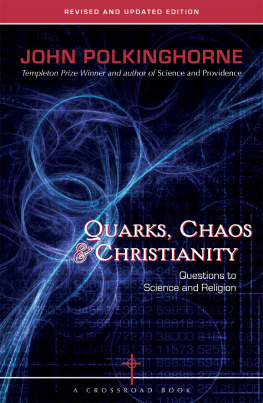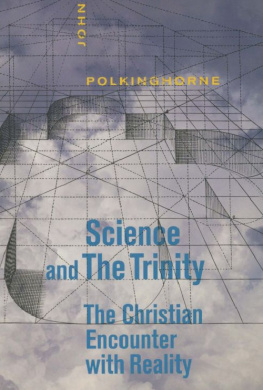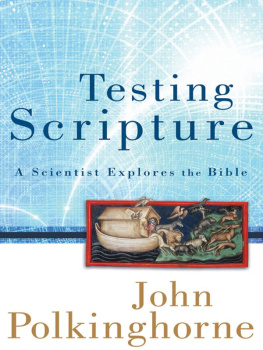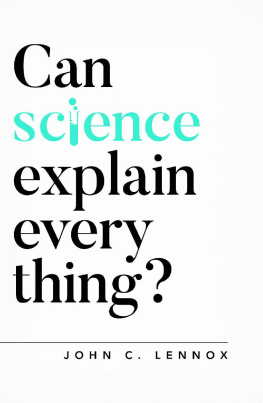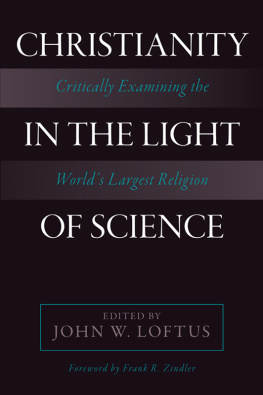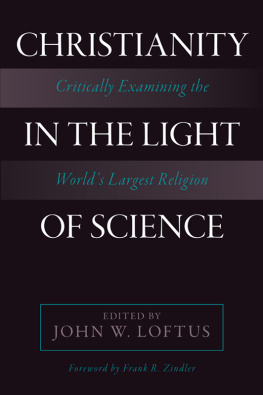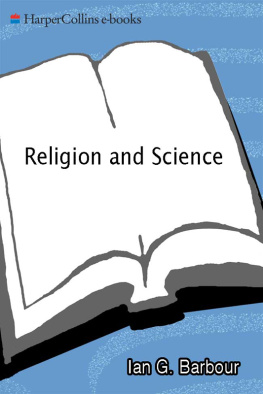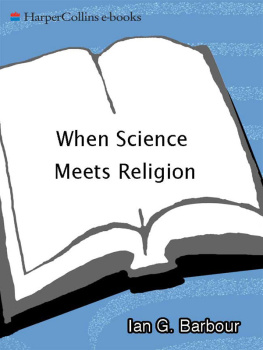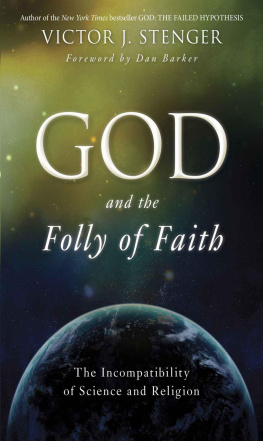John Polkinghorne was President of Queens College, Cambridge. He is an Anglican priest and a Fellow of the Royal Society. Until 1979, he was Professor of Mathematical Physics at Cambridge University. He was knighted in 1997 and awarded the Templeton Prize in 2002.
Once again I wish to thank my secretary, Mrs. Josephine Brown, for her skill and patience in deciphering my handwriting and for typing drafts of the manuscript. I am also grateful to my wife, Ruth, for help with proof correction and the staff of SPCK for their work in preparing the manuscript for press.
John Polkinghorne
Of Related Interest
Mani L. Bhaumik
CODE NAME GOD
The Spiritual Odyssey of a Man of Science
Born and raised in an impoverished area of India, Dr. Bhaumik went on to become a physicist famous as the co-inventor of excimer laser technology, the miracle behind LASIK eye surgery, which has improved the lives of thousands of people. But fame and success werent enough.
One day, I was sipping a glass of Chteau Lafit Rothschild wine with Hollywood celebrities and enjoying the life of a self-made scientific entrepreneur with a stint on Lifestyles of the Rich and Famous. The next, I was on my knees before the enormous emptiness of that existence and searching for answers to questions I hadnt asked for a long time.
However many (or few) houses I was destined to own in the future, I did not want to feel again so completely alone in them. However many lovely islands I might be privileged to gaze at, I wanted to know that their reality owed its existence to the same force that had shaped my own being.
In Code Name God, Bhaumik offers us his remarkable rags-to-riches story, his understanding of the true nature of science, and his vision of spirituality as that which gives meaning to our lives.
978-0-8245-2519-4, hardcover
Diarmuid OMurchu
QUANTUM THEOLOGY
Spiritual Implications of the New Physics
From black holes to holograms, from relativity theory to the discovery of quarks, Quantum Theology is an original exposition of quantum theory that unravels profound theological questions.
This book is not another dialogue between science and religion. It is instead a bold exploration of the divine co-creativity emanating from one of the most ingenious scientific discoveries of the twentieth century: quantum theory.
978-0-8245-2263-6, paperback
Support your local bookstore or order directly from the publisher at www.CrossroadPublishing.com
To request a catalog or inquire about quantity orders, please e-mail

If this book has whetted your appetite for thinking about science and religion, there are a variety of books that carry the matter further. With the shamelessness so characteristic of authors, perhaps I can mention my own writing first:
The Way the World Is: The Christian Perspective of a Scientist (1992). A defense of Christian belief at the same level as this book.
Science and Christian Belief: Theological Reflections of a Bottom-Up Thinker (1994). A much more detailed defense of Christian belief. Chapter 10 discusses the problem of the interrelationship of the different world religions.
Science and Theology (1998). An introductory survey written in a more academic style than this book and giving many references to related literature.
Belief in God in an Age of Science (1998). An approach to the issues using a deliberately scientific style of argument.
The God of Hope and the End of the World (2002). A full discussion of the coherence of the Christian hope of a destiny beyond death, not only for humankind but also for the universe.
Finally, if you would like to learn more about quantum theory you could try my Quantum Theory: A Very Short Introduction (2002).
For a survey of the field from another perspective, you could turn to Ian Barbours When Science Meets Religion (2000). Biologists think about some of the issues in ways subtly different from those of physicists.
In particular, biologists, understandably, have more to say about the significance of biological evolution. An introduction to the thought of the biochemist Arthur Peacocke is given in his Paths from Science towards God (2001).
Someone concerned with questions of natural theology who approaches them from outside any religious tradition is Paul Davies. See his God and the New Physics (1983) and The Mind of God (1992). An excellent book on the Anthropic Principle is John Leslies Universes (1989). A good account of chaos theory is given in James Gleicks Chaos (1988). Stuart Kauffmans lightbulb model is discussed in of his At Home in the Universe (1996).
Science is very impressive. We all benefit from its successes. I wouldnt be writing this book if the advances in medicine hadnt provided a means for me to survive a serious illness that struck twenty years ago. When I type up my scribblings, I use all the electronic wizardry of a sophisticated word processor. We all enjoy, every day of our lives, the new things made possible by the advance of science.
Science also enlightens our minds and enlarges our imaginations. We know that we are the inhabitants of an unremarkable planet, circling an unremarkable star, in a universe that contains at least ten thousand million million million stars. Once this universe looked very different from the way it does today, and it has had a long history, going back fourteen billion years to the fiery explosion of the Big Bang that gave it birth. Science tells us what makes the stars shine, why water is wet, how genetic information is conveyed from one generation to the next. Its a story of astonishing achievement, and perhaps the most impressive thing about it is that we can all agree on the answers it provides. The dust really does settle. Not only does science answer questions, it does so to universal satisfaction.
It would be foolish to deny that theres a striking contrast with religion. Well not all agree on the answer to the most fundamental religious question of them all: Is there a God? Although the different faiths clearly refer to a common human experience of the spiritual, they seem to say such different things about it. Is the individual human self of unique value and significance (so say Judaism, Christianity, and Islam), is it, in fact, an illusion (so says Buddhism), or is it recycled through reincarnation (so says Hinduism)? Is suffering something to be accepted or avoided? And so on.
The conclusion seems clear. Science is based on facts and leads to real knowledge. Religion is just based on opinion. It may help you or me to live our lives religion may be true for me or true for you but its not just plain true, pure and simple. So it may seem, but I believe that such a conclusion would be a fundamental mistake of the most disastrous kind. If I thought it were true, I would not be a religious person. How could something really help one in ones life if it were just a personal illusion? Only the true can be a real basis for living and facing death.
Two mistakes lead to the false conclusion that science and religion involve the encounter of fact with mere opinion. One is a mistake about science. The other is a mistake about religion. Lets take science first.
Many peoples impression of how science progresses is that a prediction is made (adding factor X will turn the liquid green), an experiment is performed (it does turn green), and a great new discovery has been made. In actual fact, it is all a good deal more subtle and more interesting than that. In the first case, the facts that concern scientists are already
Next page
